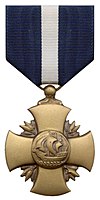Eugene Clark (U.S. Navy officer)
| Eugene F. Clark | |
|---|---|

The Navy Cross
|
|
| Born | 1911-12 |
| Died | 1998 (aged 86) |
| Allegiance |
|
| Service/ |
|
| Rank |
|
| Wars | Korean War |
| Awards | Navy Cross |
Commander Eugene F. Clark, USN, was deployed (as a lieutenant) to the Flying Fish Channel, leading into Inchon. Quickly surveying the area, he and two South Korean officers, Lieutenant Youn Joung (Navy) and Colonel Ke In-Ju (Counterintelligence), landed on Yonghung-do Island in Inchon Harbor in advance of the American-led invasion of Inchon leading to the Battle of Inchon.
Clark and the South Korean officers secured the help of the people on the island and, using captured junks, began to stage raids on the North Korean-occupied islands of Taebu-do and the harbor fortress of Wolmi-do. He also ran daily mine patrols up and down the channel to ensure the invasion fleet would not be hampered. Clark was also assisted by Commander Lee Sung Ho, the captain of one of South Korea's four gunboats, at the direction of Admiral Sohn Won-Yil, Chief of Naval Operations, South Korean Navy. He also armed and assisted organized resistance groups hiding out in the hills near Inchon. By doing this, he was able to gain valuable information about the layout of troops in the city.
The North Koreans had been slowly infiltrating men onto Yonghung-do for many days and on the night of September 14, the day before the invasion, they struck. Lieutenant Clark and his men bravely fought off the assault by a numerically superior force of North Koreans. However, they were forced to evacuate themselves and all who assisted them to the previously secured lighthouse island of Palmi-do. A day later, at the request of Clark, a battalion of Marines was deployed to take Taebu-do and Yonghung Do. They stormed the islands. However, the North Koreans had already murdered over fifty people who had helped Clark and his men, but refused to leave the island with them. Lieutenant Clark was awarded the Silver Star for "conspicuous gallantry and intrepidity" in obtaining "vital intelligence information". He was also awarded the Legion of Merit.
Later, in advance of the United Nations Forces making their way to the Yalu River, Clark, Lieutenant Youn Joung, and 150 South Korean guerrillas went island hopping up the west coast of North Korea. After several fierce firefights, Clark was secure and began infiltrating agents. When they reached the Yalu, in late October, they made a shattering discovery. Large numbers of Chinese Communist troops were crossing the Yalu into North Korea. Clark sent this information to the Far East Command in Tokyo, but they ignored it. Soon faced with a million Chi-Com "volunteers", the United Nations Forces and General Matthew B. Ridgway were driven back across the 38th parallel before being able to counterattack. Lieutenant Clark received another Silver Star for that mission.
...
Wikipedia
